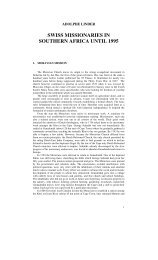THE SWISS IN SOUTHERN AFRICA 1652-1970 - swissroots-za.ch
THE SWISS IN SOUTHERN AFRICA 1652-1970 - swissroots-za.ch
THE SWISS IN SOUTHERN AFRICA 1652-1970 - swissroots-za.ch
You also want an ePaper? Increase the reach of your titles
YUMPU automatically turns print PDFs into web optimized ePapers that Google loves.
Meynraad, Jan Leenert born S<strong>ch</strong>affhausen [Meinrath, Johann Leonhard of<br />
Neunkir<strong>ch</strong> SH?]. Arrived 31.8.1712 on Limburg for Kamer Haarlem. 1 1712-1717<br />
soldier, 2 25.2.1717 guilty of stealing and deported to Europe. 3 / 1 NL, ARA, MR 1717; 2<br />
KAB, MR 1713-1717; 3 KAB, CJ 6: 6.<br />
<strong>THE</strong> FIRST SMALLPOX EPIDEMIC AT <strong>THE</strong> CAPE AND WORSE<br />
The first epidemic whi<strong>ch</strong> ravaged the Cape in 1713 was introduced in Mar<strong>ch</strong> of that<br />
year by some clothing belonging to ship’s people who had been ill during the passage<br />
from India but had recovered before rea<strong>ch</strong>ing Table Bay. The clothing was sent to be<br />
washed at the Company’s slave lodge and the women who handled it were smitten first.<br />
Within the next six months, the winter months, some 200 of the approximately 500<br />
slaves, and nearly a quarter of the Europeans at the Cape died.<br />
The plague ceased when the hot months set in. At the beginning of 1713 fourteen<br />
Swiss were known to have lived at the Cape and of these three may have died of the<br />
pox: the Company servants Wolderig Broeders of Appenzell, a stablehand; Jan Bos of<br />
Zuri<strong>ch</strong>, a cattle-herd; and Samuel Overmeyer of Basel, a corporal at the Castle. None of<br />
the free Swiss died.<br />
One of the Company servants that survived, Jan Leendert Meynraad of S<strong>ch</strong>affhausen,<br />
while on duty at the Castle in 1717, was caught stealing beer glasses from the<br />
Governor’s table, was sentenced to be scourged by the black slaves and sent to Robben<br />
Island to await the first convenient ship to deport him to Europe.<br />
Meynraad probably did not look forward to his homecoming. Switzerland was<br />
experiencing a long period of poverty and hunger. More than ever young Swiss had to<br />
leave their homes and seek a living abroad. Some found their way to the Netherlands<br />
where they took service with the Dut<strong>ch</strong> East India Company whi<strong>ch</strong> they knew entailed a<br />
very long and perilous sea voyage in uncomfortable, overcrowded ships to the ends of<br />
the earth – Java, Sumatra or Borneo – where they had to work and make war in alien<br />
conditions and an unhealthy climate. Very few could expect to be assigned to the Cape<br />
whi<strong>ch</strong> was relatively peaceful and had a healthy climate. Mostly the young men signed<br />
up to serve in one of the many Swiss regiments serving with foreign kings. As a result<br />
of their brilliant success in their fight for freedom, the Swiss had become famous for<br />
their prowess as soldiers and were mu<strong>ch</strong> sought after as mercenaries. Thus in 1748,<br />
when the total population of Switzerland was about one and a half million, nearly<br />
77 000 served all over Europe, equivalent to roughly 2½ % of the men in their prime of<br />
life.<br />
The history of early modern Europe seems to be a <strong>ch</strong>ronicle of almost continuous<br />
warfare. At the time of the first smallpox epidemic at the Cape, the Spanish War of<br />
Succession was being fought between France under the Sun King, and the allies,<br />
comprising England with their famous Duke of Marlborough, Austria and the<br />
Netherlands. This war lasted 14 years, 1701-1714. One of the biggest battles took place<br />
at Malpaquet. Some 200 000 men supported by 200 cannons faced ea<strong>ch</strong> other. The<br />
Swiss regiments serving with the Dut<strong>ch</strong> were ordered to take the Fren<strong>ch</strong> defensive<br />
positions by frontal attack. After several vain attempts during whi<strong>ch</strong> they suffered<br />
grievous losses, they succeeded in surmounting the enemy positions – and found<br />
themselves facing Swiss regiments in the service of the Fren<strong>ch</strong>. After a short moment of<br />
shocked hesitation the fight was continued and the allied troops forced the Fren<strong>ch</strong> to<br />
retire.<br />
All Swiss troops served their respective commanders loyally, the Swiss regiments in<br />
the service of the Fren<strong>ch</strong> king holding the battlefield until the whole Fren<strong>ch</strong> army had<br />
retired. It is recorded that the allies lost 20 000 men at Malpaquet, including 8 000 of<br />
their 20 000 Swiss. Of the Swiss regiment Hirzel, whi<strong>ch</strong> spearheaded the attack for the<br />
Dut<strong>ch</strong> with 1 600 men, only one officer and seventy soldiers survived.<br />
52







